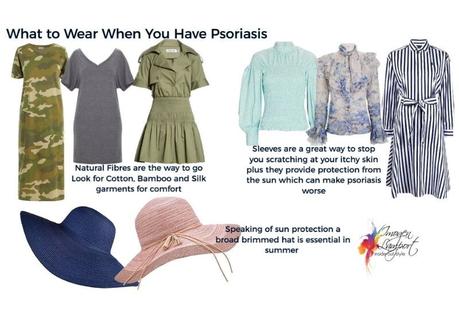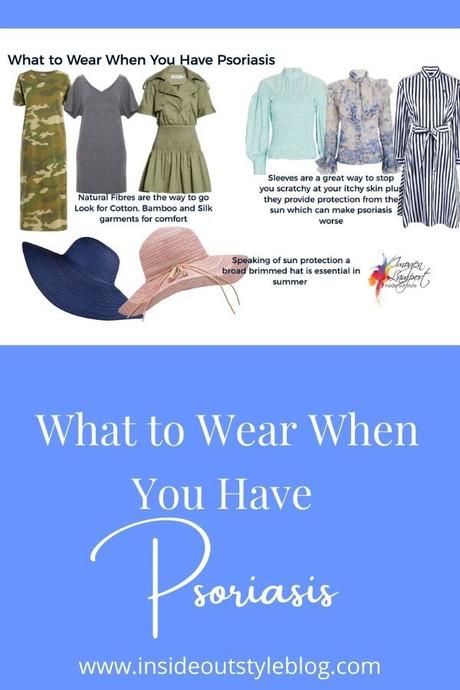



By Nyaka Mwanza.
What do you wear when you have psoriasis?
When you compare eczema vs psoriasis, two skin conditions, there are several differences — but what both have in common is that their itchy, uncomfortable, and unsightly patches of skin may drive you to choose comfort over style.
That’s because the clothes you choose to wear when you have a skin condition, whether that’s psoriasis, eczema, or other sensitive skin issues, impact more than just your fashion sense. What you wear can trigger flares, or make symptoms like burning and itching worse. On the other hand, certain clothes can also help alleviate psoriasis symptoms and offer protection from environmental irritants that you’ll want to avoid.
The good news is, there’s no reason you can’t find stylish options that work within the limitations of your condition. Remember that even when you’re not feeling your greatest, looking good can help bolster your self-confidence.
Three tips for choosing a wardrobe that’s both fashion-forward and skin-friendly
1. Choose Cotton
People with psoriasis have skin that is often more sensitive to allergens and harsh fabrics. If you have psoriasis, steer clear of synthetic fabrics and opt for fabrics made from natural materials, such as cotton.
Cotton is less likely to irritate the skin and exacerbate itchiness and inflammation. Because it is so breathable, cotton is less likely than synthetic materials to cause overheating, which can trigger psoriasis flares.
Consider making cotton a staple in your wardrobe. A simple cotton T-shirt dress is a comfy classic, and cute-but-casual T-shirt dresses in cotton fabrics can provide cooling relief during fiery skin flares. Other natural fabrics that are good for psoriatic and sensitive skin include bamboo and silk.
2. Full Sleeves Ahead

Psoriasis’s tell-tale silvery, scaly plaques and red, angry patches of skin can make some people feel self-conscious. Long sleeves don’t just offer the wearer coverage from prying eyes or their self-consciousness, but they can also be a barrier to help stop a person from scratching or picking at their skin. What’s more, long sleeves provide protection from sun exposure and harmful UV rays that can make symptoms worse. A long-sleeved shirt can also keep mosquitoes and other biting pests at arm’s length — important to avoid triggering skin trauma-related outbreaks of new psoriasis patches.
Long sleeves give you more room to play with your style, too. For instance:
- Bell sleeves,
- Puff sleeves,
- Frills on a crisp shirt can subtly elevate your look.
3. Get Shady!
Sun in small doses over time can be good for your skin, but it’s easy to get too much of a good thing. Sometimes, sun exposure or sunburn can trigger or worsen symptoms. Some psoriasis medications can cause photosensitivity, too, increasing your risk of sunburn and sun damage.
With all this in mind, a chic chapeau offers more than a chance to be fashion-forward. The right hat can provide extra protection for extra sensitive skin. A hat can protect you from sunburn or sun overexposure. Some hats help keep you cool, too, which matters because being sweaty and hot, especially in non-breathable fabrics, can exacerbate psoriasis symptoms in some people.
When it comes to the size of the brim of your hat (and the shady sun protection it provides), remember that more is more. A big, bold hat can be a fully functional statement piece.
Whether you have psoriasis, eczema, or other types of sensitive skin, choosing your outfits doesn’t need to be a battle between fashion sense and common sense. You can serve fierce, on-trend looks that are skin-friendly and style-savvy.
References
- Eczema vs. Psoriasis: Are They One and the Same?
- Psoriasis and the sun: will sunbathing help my psoriasis?
- Eczema – Friendly Clothing
- ARE TRIGGERS CAUSING YOUR PSORIASIS FLARE-UPS?
- Psoriasis Symptoms

About Nyaka: Nyaka Mwanza is a freelance writer for MyHealthTeams. She completed a B.A. in Communications: Visual Media from American University and undertook post-baccalaureate studies in Health/Behavioral Communications and Marketing at Johns Hopkins University. Nyaka is a Zambian-born, E.U. citizen who was raised in sub-Saharan Africa and Jacksonville, N.C. However, she has called Washington, D.C., home for most of her life. For much of her career, Nyaka has worked with large global health nonprofits focused on improving health outcomes for women and children. Nyaka believes words hold immense power, and her job is to meet the reader where they are, when they’re there.





